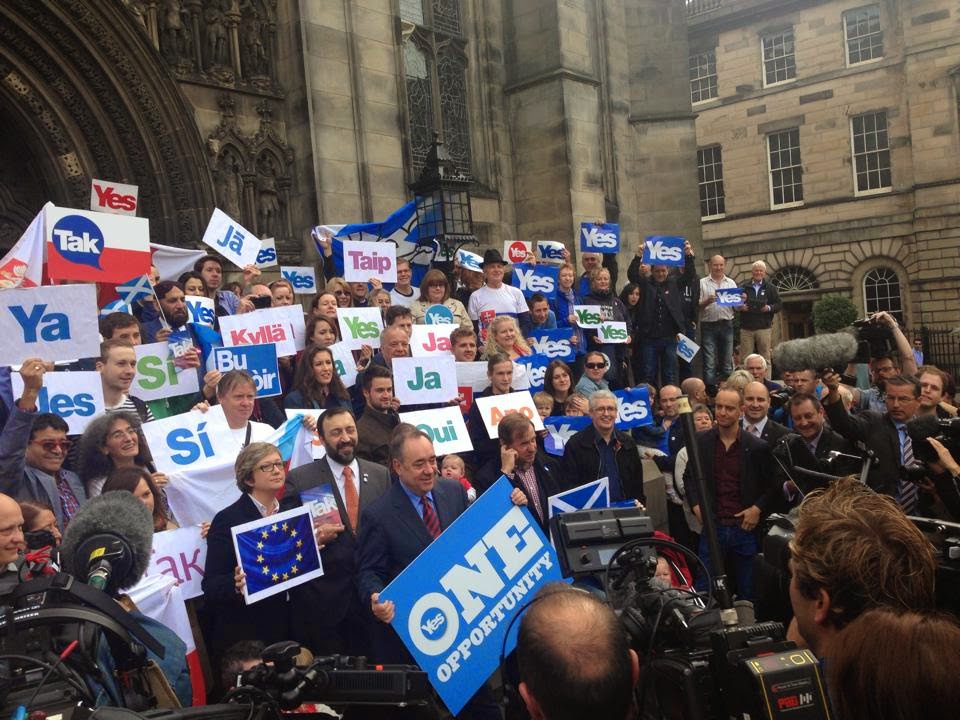Today, the Edinburgh International Festival will stage a production of the most beautiful film to have been produced in Scotland during the year of its independence referendum.
From Scotland with Love is a mesmerising account of the country in the 20th century, assembled from newsreel footage by Virginia Heath, and set to a soundtrack by Kenny Anderson, known as King Creosote.
First reviews were unanimous. “A magical window on Scotland’s past” ran one headline; “delicate and beautifully observed” said another. But almost as soon as the film was released, it proved a battleground for Anderson, who will perform the soundtrack live at the Hub on Friday and Saturday.
All the strife, he admits, was partly his own fault. The singer-songwriter may be a Scot born and bred, but cocooned in a creative bubble, he had never really considered the impact of releasing the most emotive of titles at such an historic moment. “I know I was an idiot,” he says, mock apologetic, “but I just didn’t see in coming.”
Now, ensconced in a Glasgow rehearsal room, he can remember the shock when he sat down for the media calls which followed film’s release. “First interview, early question: ‘You’re obviously going to vote yes, so how are you going to feel when you wake up and there’s an independent Scotland?’ I’m like: ‘Whoa, wait a minute, where are you getting that?
“It just went on from there. More annoyingly it was always Yes-loaded. Everyone who asked about the music assumed I was pushing for independence. Every interview, I had to say. ‘Isn’t there an argument that I can love Scotland as part of the UK? Why am I less Scottish in your eyes if I have alliances with different people around the place?
“In the real world, best pals I had through school and university were hitting me with this nationalist, ‘We are better on our own, without the English.’ Worst of all, I was being lambasted for having a different opinion from them. And of course I was being negative, because ‘No’ is negative.
“When I saw it happening in my family, my brothers picking on my mother. I thought, ‘What is going on? It’s ridiculous that some wedge has been driven in.’”
 |
| Kenny Anderson, Glasgow: He was like: "Go on, stick it to them." |
He grins. “I’ve got that little bit of badness in me. I thought, ‘I’ll see what happens if I say something about the No side. Derek (O’Neil) on keyboards is from Blantyre, staunch Labour, he was like, ‘Go on, stick it to them.’ I did. People were shouting: ‘We are here for your music, not your politics!’
“One guy shouted: ‘Shut up!’ I yelled back: ‘No, you shut up!’ People were leaving, there were boos. But then this big guy, right at the front, stretched out his arm and just yelled ‘Nooo!’”
After the gig came the backlash. “At the heart of the storm, people would say: ‘Who’s going to buy your record now?’ I’m like: ‘Get over yourself. I might lose less than half my Scottish sales? And what are they going to do? Burn the albums? Not like my music any more?”
He doesn’t take part in social media, but when friends told him about the abuse being heaped upon is head, he couldn’t resist a peek. “I saw one guy, ‘King Ringpiece’ he called me. I was like ‘Bring it on!’ That’s Scotland, right there.”
He loves the little details in life. Anderson was born on Candlemas, 1967, and brought up in St Andrews. His mother came from a Crail fishing family and his father was a professional accordionist.
Aside from taking an electronics degree in Edinburgh, and two years busking in France, he has spent all his life in north east Fife. The essence of the place, the swathe of rolling green countryside, the people, the pretty villages and the sea beyond formed his outlook and a music, spanning more than 40 lo-fi albums.
Like the Crail boats that used to trawl for herring between Portsoy and Great Yarmouth, he doesn’t acknowledge conventional boundaries he says. There are far more King Creosote fans in “music towns” like Norwich, Nottingham or Manchester, than in Dundee and Kirkcaldy, places which are a bike ride from where he lives.
His background helps to explain his attitude to the film project. Aside from some of the most recognisable events and locations – images of ‘Main St’ St Kilda or tanks in George Square, Glasgow – he insists this isn’t about Scotland. Any faded colonial power could have supplied the archive of screen image: mines, steel works, factories, dance-halls, fun fairs, harvesting, holidays.
A year since From Scotland with Love caused so much angst, he remains “wrankled constantly” by the mood he still sometimes encounters . ‘People are like ‘Grrrr, f*** ing no voter,’” he says laughing.
As for the “machinations” of the SNP at Westminster, he detests the party’s assumption that it speaks for the whole of Scotland, and the breach of faith which has allowed ‘once in a lifetime’ to become another referendum in a year or two.
“The amount of times I have thrown my rubber-soled shoe at the telly when Nicola Sturgeon comes on ….,” he says, with a shake of the head.
“I know if I met these people I would probably like them, but I just don’t think that Scotland has all the answers. I think it’s a horrible thing to even try to say: ‘O no we are way more sociable and socially inclusive up here. We are different. We are better.’
“We are not better. We are colder and wetter, but not better.”



